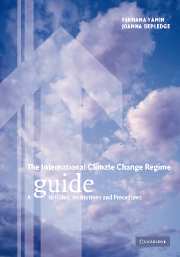Book contents
- Frontmatter
- Contents
- List of figures
- List of tables
- List of boxes
- Foreword by Joke Waller Hunter, Executive Secretary, FCCC
- Preface and acknowledgements
- List of abbreviations
- 1 Introduction
- 2 Overview
- 3 Regime participants
- 4 Objective and principles
- 5 Mitigation commitments
- 6 Flexibility mechanisms
- 7 Research, systematic observation, education, training and public awareness
- 8 Adaptation
- 9 Impacts of response measures
- 10 Finance, technology and capacity-building
- 11 Reporting and review
- 12 Compliance
- 13 Institutions
- 14 The negotiation process
- 15 Scientific and technical input
- 16 Administering the regime
- 17 Linkages
- 18 Evolution of the regime
- 19 Conclusion: taking stock and moving forward
- Appendix I List of Parties, their groups and key statistics
- Appendix II Annex I Party fact sheets: emissions, targets and projections for Annex I Parties and groupings
- Appendix III Table of Articles, issues and COP Decisions
- Bibliography
- Index
Foreword by Joke Waller Hunter, Executive Secretary, FCCC
Published online by Cambridge University Press: 16 July 2009
- Frontmatter
- Contents
- List of figures
- List of tables
- List of boxes
- Foreword by Joke Waller Hunter, Executive Secretary, FCCC
- Preface and acknowledgements
- List of abbreviations
- 1 Introduction
- 2 Overview
- 3 Regime participants
- 4 Objective and principles
- 5 Mitigation commitments
- 6 Flexibility mechanisms
- 7 Research, systematic observation, education, training and public awareness
- 8 Adaptation
- 9 Impacts of response measures
- 10 Finance, technology and capacity-building
- 11 Reporting and review
- 12 Compliance
- 13 Institutions
- 14 The negotiation process
- 15 Scientific and technical input
- 16 Administering the regime
- 17 Linkages
- 18 Evolution of the regime
- 19 Conclusion: taking stock and moving forward
- Appendix I List of Parties, their groups and key statistics
- Appendix II Annex I Party fact sheets: emissions, targets and projections for Annex I Parties and groupings
- Appendix III Table of Articles, issues and COP Decisions
- Bibliography
- Index
Summary
Addressing growing concerns about climate change requires a broad understanding of its social, economic, developmental, scientific, political and environmental aspects. Increases in temperature as a result of increasing emissions of greenhouse gases will have serious impacts on our economic well-being and on the ecosystems on which the health of our planet depends. With the expected increase in the intensity and frequency of extreme weather events such as floods and droughts, and their devastating effects, climate change needs continued urgent attention. Governments worldwide are engaged in constructive dialogue aimed at finding and implementing practical and efficient solutions to address the global problem of climate change. This includes mitigation measures for the reduction of GHGs, as well as identifying ways to reduce countries' vulnerabilities to the effects of climate change.
The United Nations Framework Convention on Climate Change was adopted in 1992 and entered into force two years later. Today, it enjoys almost universal membership, with 188 countries joining together in a unique example of multilateralism to confront the global challenge of climate change.
An intergovernmental process facilitates and supports the implementation of the Convention. In this process countries discuss and agree on action needed to stabilise our global climate. As part of this ongoing dialogue, in 1997 governments adopted the Kyoto Protocol to the Convention, which contains more specific, binding commitments and concrete reduction targets, with specific deadlines for industrialised countries.
Each year, countries meet to discuss and agree on further action.
- Type
- Chapter
- Information
- The International Climate Change RegimeA Guide to Rules, Institutions and Procedures, pp. xxi - xxiiPublisher: Cambridge University PressPrint publication year: 2004



